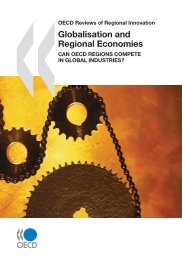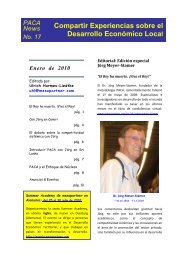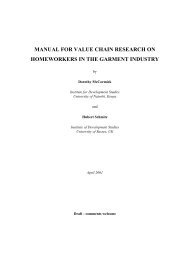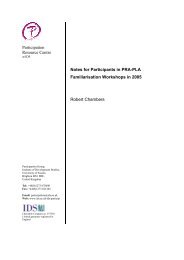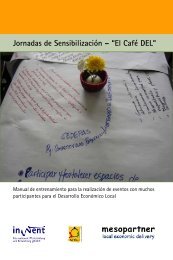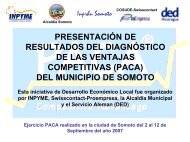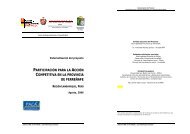OECD Culture and Local Development.pdf - PACA
OECD Culture and Local Development.pdf - PACA
OECD Culture and Local Development.pdf - PACA
You also want an ePaper? Increase the reach of your titles
YUMPU automatically turns print PDFs into web optimized ePapers that Google loves.
2. LOCAL DEVELOPMENT BASED ON ATTRACTING VISITORS AND TOURISTS<br />
they participate in the works, <strong>and</strong> at the end of the normal three-year term of the<br />
“school workshop” they can move on to work with other firms, or in other sectors<br />
of the economy, starting with public works, where they can put their acquired skills<br />
to good use. The school-workshop system accomplishes three objectives: heritage<br />
restoration; creation, upgrading <strong>and</strong> transmission of skills <strong>and</strong> know-how; <strong>and</strong> a<br />
higher quality of output in all economic sectors through the spread of such knowhow.<br />
A number of civil <strong>and</strong> religious buildings in Castile <strong>and</strong> Andalusia have been<br />
renovated in this way, thereby preserving highly useful trades such as wood<br />
sculpture, ceramic tiling, restorative carpentry, skills that would have disappeared<br />
without these projects, <strong>and</strong> that can be used in future conservation work.<br />
An even more original example is to be found in the Canary Isl<strong>and</strong>s. Tourism has<br />
exacted a heavy toll on heritage <strong>and</strong> on the environment both along the coast<br />
<strong>and</strong> in the interior of Gr<strong>and</strong> Canary: advertising billboards are everywhere,<br />
h<strong>and</strong>icrafts have been internationalised, buildings sprout up everywhere in<br />
complete disregard of existing structures <strong>and</strong> vernacular architecture. Since there<br />
was no question of trying to do without the great inflow of tourists to the isl<strong>and</strong>,<br />
the strategy selected was to supplement the dominant form of tourism with an<br />
alternative approach to tourism, based on heritage appreciation. This has involved<br />
redeveloping a number of villages, rehabilitating heritage buildings, <strong>and</strong> protecting<br />
exceptional flora. Specialised school workshops were set up to rehabilitate urban<br />
or rural properties that had ethnographic or architectural value, such as stone roads,<br />
walls, hedges, traditional barns, <strong>and</strong> the h<strong>and</strong>icraft potential was renewed. Interest<br />
in the school workshops has not disappeared with the achievement of these<br />
initial objectives, <strong>and</strong> already a series of traditional crafts have been revived, offering<br />
high-quality services in trades as varied as construction, gardening, pottery <strong>and</strong><br />
lace-making, where nearly 400 jobs or skills have been created<br />
These programmes, often socially funded, are criticised because they are costly<br />
<strong>and</strong> because their beneficiaries do not always set up their own businesses, <strong>and</strong><br />
may not even be able to find a job. Yet costs <strong>and</strong> outcomes are hardly different<br />
here from what they are in other fields, as the <strong>OECD</strong> evaluation showed 45 . In fact,<br />
the impact can be measured in terms of better heritage conservation, with the<br />
expected positive economic <strong>and</strong> social spin-offs in terms of employment (after<br />
one year, 75% of students found a job, 55% of them in the specialty for which they<br />
were trained), <strong>and</strong> in terms of the enhanced quality of human resources 46 .<br />
- The combination of all these effects suggests that the conservation <strong>and</strong> upgrading<br />
of heritage buildings is a major economic activity. To demonstrate this, we<br />
return to the analysis undertaken in France by the Ministry of <strong>Culture</strong> (Greffe<br />
<strong>and</strong> Pflieger, 2003).<br />
CULTURE AND LOCAL DEVELOPMENT - ISBN 92-64-00990-6 - © <strong>OECD</strong> 2005 65



